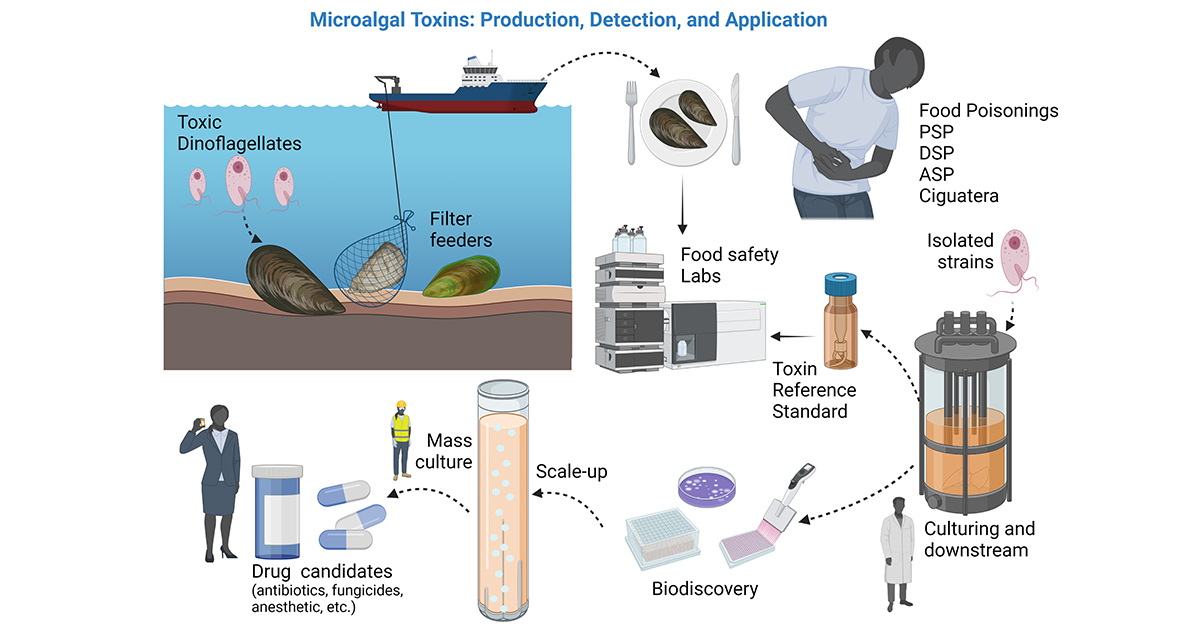Advances in Microalgae Toxins: Production, Detection, and Application
A special issue of Toxins (ISSN 2072-6651). This special issue belongs to the section "Marine and Freshwater Toxins".
Deadline for manuscript submissions: closed (2 September 2023) | Viewed by 13631

Special Issue Editor
Interests: biochemical engineering; bioprocess; technology; microalgae; marine toxins; marine ecology; cell lysis; chemical engineering; industrial biotechnology; photobioreactors
Special Issues, Collections and Topics in MDPI journals
Special Issue Information
Dear Colleagues,
Dinoflagellate microalgae are an important source of marine metabolites. These toxins and bioactives are of increasing interest because of their influence on the safety of seafood and their potential medical and biotechnological applications. Nowadays, bioactive supply is still the main bottleneck due to the difficulty of growing dinoflagellates in photobioreactors. Only sparing quantities of dinoflagellate bioactives are available for researchers, hindering their characterization and evaluation for possible applications. Despite this, in recent years advances have been made in every aspect related to the biotechnological exploitation of this resource. For instance, novel molecules and potential applications for dinoflagellate bioactives have been shown. Additionally, new approaches for culturing and downprocessing biomasses have been presented.
This Special Issue aims to provide insight into the potential of dinoflagellate’s bioactives to develop bioprocess with these microalgae and the obstacles that remain. Accordingly, it will foster contributions focused on dinoflagellates that address biodiscovery, metabolite characterization, cell culture, and bioprocess optimization (upstream and downstream). This Special Issue is intended to be of interest for those involved in the field from different perspectives.
Dr. Juan Jose Gallardo Rodriguez
Guest Editor
Manuscript Submission Information
Manuscripts should be submitted online at www.mdpi.com by registering and logging in to this website. Once you are registered, click here to go to the submission form. Manuscripts can be submitted until the deadline. All submissions that pass pre-check are peer-reviewed. Accepted papers will be published continuously in the journal (as soon as accepted) and will be listed together on the special issue website. Research articles, review articles as well as short communications are invited. For planned papers, a title and short abstract (about 100 words) can be sent to the Editorial Office for announcement on this website.
Submitted manuscripts should not have been published previously, nor be under consideration for publication elsewhere (except conference proceedings papers). All manuscripts are thoroughly refereed through a double-blind peer-review process. A guide for authors and other relevant information for submission of manuscripts is available on the Instructions for Authors page. Toxins is an international peer-reviewed open access monthly journal published by MDPI.
Please visit the Instructions for Authors page before submitting a manuscript. The Article Processing Charge (APC) for publication in this open access journal is 2700 CHF (Swiss Francs). Submitted papers should be well formatted and use good English. Authors may use MDPI's English editing service prior to publication or during author revisions.
Keywords
- dinoflagellate
- bioactives
- bioprocess
- marine toxins
Benefits of Publishing in a Special Issue
- Ease of navigation: Grouping papers by topic helps scholars navigate broad scope journals more efficiently.
- Greater discoverability: Special Issues support the reach and impact of scientific research. Articles in Special Issues are more discoverable and cited more frequently.
- Expansion of research network: Special Issues facilitate connections among authors, fostering scientific collaborations.
- External promotion: Articles in Special Issues are often promoted through the journal's social media, increasing their visibility.
- e-Book format: Special Issues with more than 10 articles can be published as dedicated e-books, ensuring wide and rapid dissemination.
Further information on MDPI's Special Issue polices can be found here.






